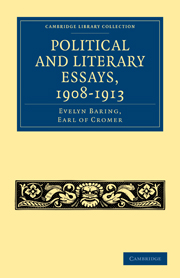Book contents
- Frontmatter
- PREFACE
- Contents
- “THE EDINBURGH REVIEW”
- “THE QUARTERLY REVIEW”
- “THE NINETEENTH CENTURY AND AFTER”
- “THE SPECTATOR”
- VIII DISRAELI
- IX RUSSIAN ROMANCE
- X THE WRITING OF HISTORY
- XI THE GREEK ANTHOLOGY
- XII LORD MILNER AND PARTY
- XIII THE FRENCH IN ALGERIA
- XIV THE OTTOMAN EMPIRE
- XV WELLINGTONIANA
- XVI BURMA
- XVII A PSEUDO-HERO OF THE REVOLUTION
- XVIII THE FUTURE OF THE CLASSICS
- XIX AN INDIAN IDEALIST
- XX THE FISCAL QUESTION IN INDIA
- XXI ROME AND MUNICIPAL GOVERNMENT
- XXII A ROYAL PHILOSOPHER
- XXIII ANCIENT ART AND RITUAL
- XXIV PORTUGUESE SLAVERY
- XXV ENGLAND AND ISLAM
- XXVI SOME INDIAN PROBLEMS
- XXVII THE NAPOLEON OF TAINE
- XXVIII SONGS, PATRIOTIC AND NATIONAL
- XXIX SONGS, NAVAL AND MILITARY
- INDEX
XXIII - ANCIENT ART AND RITUAL
Published online by Cambridge University Press: 07 September 2011
- Frontmatter
- PREFACE
- Contents
- “THE EDINBURGH REVIEW”
- “THE QUARTERLY REVIEW”
- “THE NINETEENTH CENTURY AND AFTER”
- “THE SPECTATOR”
- VIII DISRAELI
- IX RUSSIAN ROMANCE
- X THE WRITING OF HISTORY
- XI THE GREEK ANTHOLOGY
- XII LORD MILNER AND PARTY
- XIII THE FRENCH IN ALGERIA
- XIV THE OTTOMAN EMPIRE
- XV WELLINGTONIANA
- XVI BURMA
- XVII A PSEUDO-HERO OF THE REVOLUTION
- XVIII THE FUTURE OF THE CLASSICS
- XIX AN INDIAN IDEALIST
- XX THE FISCAL QUESTION IN INDIA
- XXI ROME AND MUNICIPAL GOVERNMENT
- XXII A ROYAL PHILOSOPHER
- XXIII ANCIENT ART AND RITUAL
- XXIV PORTUGUESE SLAVERY
- XXV ENGLAND AND ISLAM
- XXVI SOME INDIAN PROBLEMS
- XXVII THE NAPOLEON OF TAINE
- XXVIII SONGS, PATRIOTIC AND NATIONAL
- XXIX SONGS, NAVAL AND MILITARY
- INDEX
Summary
“The Spectator,” August 9, 1913
Any new work written by Miss Jane Harrison is sure to be eagerly welcomed by all who take an interest in classical study or in anthropology. The conclusions at which she arrives are invariably based on profound study and assiduous research. Her generalisations are always bold, and at times strikingly original. Moreover, it is impossible for any lover of the classics, albeit he may move on a somewhat lower plane of erudition, not to sympathise with the erudite enthusiasm of an author who expresses “great delight” in discovering that Aristotle traced the origin of the Greek drama to the Dithyramb—that puzzling and “ox-driving” Dithyramb, of which Müller said that “it was vain to seek an etymology,” but whose meaning has been very lucidly explained by Miss Harrison herself—and whose “heart stands still” in noting that “by a piece of luck” Plutarch gives the Dionysiac hymn which the women of Elis addressed to the “noble Bull.”
It is probable that the first feeling excited in the mind of an ordinary reader, when he is asked to accept some of the conclusions at which modern students of anthropology and comparative religion have arrived, is one of scepticism. Miss Harrison is evidently alive to the existence of this feeling, for in dealing with the ritualistic significance of the Panathenaic frieze she bids her readers not to “suspect they are being juggled with,” or to think that she has any wish to strain an argument with a view to “bolstering up her own art and ritual theory.”
- Type
- Chapter
- Information
- Political and Literary Essays, 1908–1913 , pp. 361 - 371Publisher: Cambridge University PressPrint publication year: 2010First published in: 1913

